I recently checked my “Tea Book” tag and I realised that I have 35 posts in this tag! Even if you assume that some books have two posts (which is pretty rare), it still implies that I read a lot of tea books. So I thought it would be fun to do a post about what book about tea you should read, based on what you want to read.
Introductory Books about Tea
If you’re thinking of moving past teas from bags or you want to start drinking more of a certain type of tea (or just tea in general!) and don’t know where to start, these are the books I would recommend. I find them to be very accessible, in terms of writing style, and don’t assume much, if any, prior knowledge about tea.
If you want a general introduction to tea, read: Infused by Henrietta Lovell
This may be the most contentious entry on the list, but I consider Infused to be the best introduction to tea because:
- It’s a memoir of a life with tea, and I think Henrietta makes a fantastic case for why tea is so fascinating and why fine tea (and ethical tea) should cost more than what we see in the supermarket. It’s so much more personal than a general book that tells you about how tea is made, the types of tea, etc and I think Henrietta’s story will get a new tea drinker interested in tea much more than bare facts about tea will.
- Even though it’s a memoir, it manages to include all the basics about tea with instructions on how to brew a cup. Henrietta brings us to various tea farms and shows us the global nature of tea.
Personally, I think that if you’re interested in drinking loose leaf tea and don’t know how, or if you want to convert a friend/family member to the wonderful world of tea, Infused is the book that’s going to get you fired up about this marvellous drink.
If you want a general introduction to the history of tea, read: Tea: The Drink that Changed the World by Laura C. Martin
This is one of the first few books that I read but I still recommend it because it’s a great introduction to tea. My general impression of most history books about tea is that it tend to focus either on the history in the West or in the East, but Tea: The Drink That Changed the World manages to provide a truly global history of tea.
If you want to get to know Chinese Tea, read: An Illustrated Modern Reader of The Classic of Tea by Wu Juenong
If you want to start learning about Chinese tea, you’ll inevitably come across The Classic of Tea, and for good reason too. You could argue that The Classic of Tea helped tea become the national drink of China (and come up with the word 茶/cha), making it a foundational text for anyone who wants to peek into Chinese tea. This reader not only gives you an English translation of The Classic of Tea, the commentary helps to link tea culture in the Tang dynasty to the start of modern tea culture in China
If you want to get to know Japanese tea, read: The Story of Japanese Tea by Tyas Sosen
Surprisingly, I’ve not seen many books about Japanese tea that are in English and accessible to the average tea-drinker. Thankfully, we have The Story of Japanese Tea which gives you an overview of the history, cultivation, and production of Japanese tea. I personally found this to be the most accessible yet thorough introduction to Japanese tea I’ve seen so far.
If you want to get to know Darjeeling tea, read: Darjeeling by Jeff Koehler
Koehler’s book follows the four harvesting seasons (or four flushes) of Darjeeling tea as he looks into the history and present-day conditions of Darjeeling. This book goes beyond the taste and history of Darjeeling and covers the challenges it faces, the initiatives it’s undertaking, as well as talking about some of the tea gardens in Darjeeling.
Intermediate Books about Tea
If you’ve got a grasp of the basics of tea and want to learn more but don’t want to face the terror of academic texts, these books are for you. They go into a bit more depth while largely avoiding the worst of the stiff academic style that can be hard to read.
If you want to learn about the chemistry of tea, read: Three Basic Teas and How to Enjoy Them by Virginia Utermohlen Lovelace, MD
You don’t have to know about the chemistry of tea to enjoy it, but if you do want to delve into the science of tea, I cannot recommend Three Basic Teas and How to Enjoy Them highly enough. Virginia managed to make the science of tea comprehensible to a lay person like me, explaining why teas taste the way they do and how we can pair teas with food. While the title only covers three types of tea (Green, Black, and Oolong), I think this provides a good foundation for the science of tea.
If you want to go deep into Puer, read: Puer Tea: Ancient Caravans and Urban Chic by Jinghong Zhang
It has been some time since I read this, but I remember this as a fairly accessible academic work, suitable for people who want their tea books with a bit more bite. Zhang centers around the 2007 bubble and crash of puer, focusing on how the rapid rise in the value of puer tea transformed the industry for this specific category of tea. This is a must-read for anyone who wants to understand the modern-day puer market.
If you want to go deep into the history of tea in the West, read: A Thirst for Empire by Erika Rappaport
This is one of my favourite books about tea in the West! I called it “academic” on my first reading, but I’ve read many other books about tea since and I think this one isn’t too bad. Rappaport focuses on the history of tea with relation to the British Empire, exploring things like the temperance movement, the empire kitchen (and how that was used to increase the popularity of Indian teas) and even the emergence of ‘afternoon tea’ as a concept.
Advanced Books about Tea
You’ve read the introductory books, you follow tea blogs and youtube channels and now, you want something more. These books are intimidating (they intimidated me, at any rate!) but they can help you think about tea more deeply.
If you want a general academic book about tea, read: The Tale of Tea by George van Driem
As expensive as it is, The Tale of Tea remains the most comprehensively researched book about tea, starting with its origins in the Yunnan/Myammar region and ending in the 20th century. The book does tend to go on long tangents that might not interest someone who just wants to read about the history of tea around the world, but contains a lot of information covering topics from archaeological findings, etymology, to general tea culture in one book that a tea-drinker who really wants to dig deep into the subject will find valuable.
If you want to go deep into the history of tea in China, read: Tea in China by James A. Benn
Tea in China looks at tea through a a religious and cultural lens. It starts in the Pre-Tang era and ends in the Ming dynasty, but the focus of the book is on tea in the Tang and Song dynasty. Although it’s mainly about China, there is a chapter on the Kissa Yojoki, a document that reveals a lot about how tea was seen.
If you want to go deep into the history of tea in Japan, read: A Bowl for a Coin by William Wayne Farris
If you want to know how tea was grown, how the tea market has changed, and the role tea played in Japan’s economic history, this is the book for you. By referencing a variety of documents, including those relating to land and taxes, Farris manages to connect the dots to create a history of tea from the 8th century to the modern day that complements the cultural histories of tea and the tea ceremony that we might be more familiar with. Bonus – the kindle version is free!
If you want to learn more about the tea industry in early-modern China and India: Tea War by Andrew B. Liu
Tea War looks at the tea industry in both early-modern China and India through a political economic lens. It was hard for me to read, but I found a lot of valuable information inside – particularly about the Indian tea industry in general, which is something I’ve not read much about.
For the academic works, I could go on and on and provide books for many more niches, but I think the above would provide a lot of material for the average tea drinker who wants to take things up a notch. If I read any books that I feel must be on the list (I’d love to find a general book for tea history in India and other parts of the world), I will update this post, so send me your recommendations!


I admit I had no idea there were so many different options out there to learn about tea! This is actually a really useful guide!
Thank you! There’s a lot of material out there, and a lot of tea to drink (;
I think that you offer the world lots on books and teas and where do you find the time to do it all. Simply amazing. Best in all!
Thank you! I hope you find this helpful!
Oh my gosh the effort put in! This is beautiful!! Honestly what a comprehensive guide!!
Thank you!!! I hope it gives you reading inspiration!!!